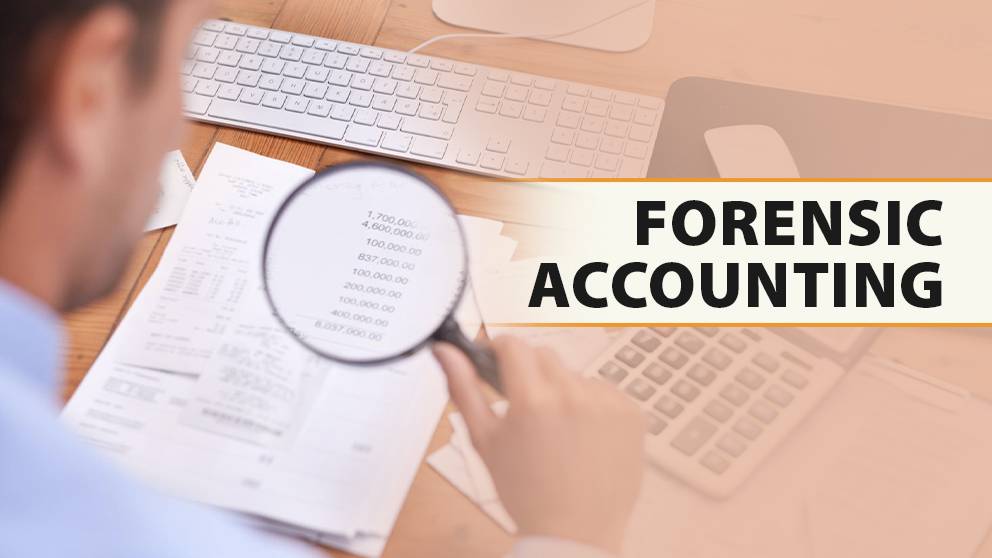What is a Forensic Accountant?
Forensic accounting combines accounting, auditing, and investigative skills to look into financial records and transactions that might show evidence of financial fraud, embezzlement, or other financial crimes [1]. Traditional accountants focus on financial statements and regulatory compliance. Forensic accountants take a closer look at financial data to find irregularities and fraud [2].
The Institute of Certified Forensic Accountants (ICFA) sees forensic accounting as an approach that employs accounting techniques, auditing processes, and investigative skills to find evidence of financial crimes [3]. This specialized field connects the accounting profession with the criminal justice system. Lawyers and law enforcement officials can get the evidence they need for their cases.
Think of forensic accountants as financial detectives. They blend accounting expertise with investigative skills and legal knowledge to find fraud schemes, measure damages, and give valuable insights to stakeholders [2]. Their work focuses on tracking transactions, analyzing complex financial data, and spotting discrepancies that might point to fraud. To name just one example, a forensic accountant might look into sudden spikes in vendor payments within a company’s accounts payable system. This could reveal a fraudulent scheme with a shell company [2].
Key responsibilities of forensic accountants include:
- Fraud detection and prevention through analysis of financial statements to identify irregularities
- Litigation support by preparing detailed reports for legal proceedings
- Asset tracing and recovery in cases of misappropriation
- Expert witness testimony in court proceedings
- Conducting financial investigations for criminal and civil cases
- Assessing financial risks and recommending controls
- Supporting discovery during litigation
Forensic accountants need deep knowledge of legal proceedings and must work well within a legal framework [1]. They give objective, unbiased opinions on matters within their expertise when acting as expert witnesses [4]. On top of that, they explain complex financial transactions and numerical data in simple terms that ordinary people can understand. This skill becomes crucial when presenting evidence to juries [4].
A forensic accountant’s role is different from an auditor’s role. Auditors handle gross financial statements and verify compliance. Forensic accountants investigate and analyze factual information related to financial crimes [4]. They go beyond routine financial activities by rebuilding financial records and finding patterns that show fraud or misconduct [3].
Professionals in this field usually hold certifications such as Certified Public Accountant (CPA), Certified Fraud Examiner (CFE), or Certified in Financial Forensics (CFF) [5]. Specialized credentials like Accredited in Business Valuation (ABV) boost their expertise, especially when valuing businesses in legal disputes.
Financial crimes keep getting more sophisticated. Forensic accountants now use advanced tools like data analytics, digital forensics, and blockchain tracking methods to spot irregularities in financial transactions [2]. This field continues to expand, and experts expect the global forensic market to reach USD 7.95 billion by 2028[2].
How to Become a Forensic Accountant
Image Source: Accounting.com
A career in forensic accounting demands specific education, credentials, and skills. The path to success follows several steps that build your expertise in this specialized field.
Earn a degree in accounting or finance
A bachelor’s degree in accounting or related field builds the foundation for your forensic accounting career. You need in accounting, forensic accounting, finance, or business administration for most entry-level positions at minimum a four-year degree[6]. A master’s degree opens more doors for advancement and prepares you for leadership roles [7]. Your academic program should cover forensic accounting and fraud examination to help you learn about fraud detection, investigative methods, and legal procedures [6].
Get CPA licensure and relevant experience
A CPA license is crucial for forensic accountants, especially when you have plans for advanced certifications. The path to becoming a forensic CPA starts with getting a CPA license through education, examination, and experience [8]. You typically need 120 postsecondary credits, one year of accounting experience, and must pass the Uniform CPA Exam [7]. Most forensic accountants need 1-3 years of professional accounting experience before they specialize [9]. Many professionals start in general accounting roles before moving to forensic work.
Pursue specialized certifications like ABV or CFE
Professional certifications set forensic accountants apart and showcase their specialized expertise:
- Certified Fraud Examiner (CFE): You need about five years of education (or equivalent experience), two years of fraud-related experience, and must pass the CFE Exam [7]. The CFE credential gives you the technical knowledge needed for effective investigations [9].
- Certified in Financial Forensics (CFF): This requires valid CPA licensure plus specialized experience in forensic accounting [5]. The credential proves your expertise in bankruptcy, insolvency, litigation support, and family law support services.
- Accredited in Business Valuation (ABV): This AICPA certification proves valuable for business valuation in legal disputes [10].
Develop investigative and analytical skills
Forensic accountants need specific competencies beyond standard accounting skills. Strong analytical capabilities help professionals assess transaction legitimacy and determine accurate business reporting [11]. Your attention to detail matters when you review large amounts of financial data to spot anomalies [11]. Problem-solving abilities and adaptability let you explore different angles while investigating potential fraud [11]. Advanced computer skills, particularly with data analysis tools, have become essential as technology reshapes the field [11].
Where Do Forensic Accountants Work?
Forensic accountants work in a variety of professional settings. They use their specialized skills to uncover financial discrepancies and deliver significant financial insights. Many organizations seek their expertise when they need financial investigation capabilities.
Litigation support firms
Litigation support firms rely on forensic accountants throughout all phases of legal disputes. These professionals break down complex accounting issues, prepare detailed reports for legal proceedings, and help develop case strategies [12]. Forensic consultants take on project-based work and provide expertise in financial investigations and fraud prevention for clients of all types [1]. They help turn data into detailed analyzes used in fraud cases, financial crime investigations, and maybe even murder trials [3]. These firms often handle embezzlement investigations, and some focus on digital forensics [13]. Their work includes analyzing post-acquisition disputes, shareholder disputes, and intellectual property matters [14].
Insurance companies and adjusters
Insurance companies need forensic accountants to assess and detect insurance fraud. These specialists look into cases like arson, false claims, staged accidents, and exaggerated medical expenses [15]. They study financial motives and insurance claims to help companies verify claim validity. This work reduces financial losses from fraud while ensuring legal compliance [15]. Forensic accounting plays a vital role in determining insurance claims costs for commercial cases [3]. These experts help with various insurance claims, including personal injury, employee dishonesty, cyber, time element, and builder’s risk [16].
Government agencies like the FBI
Government organizations employ many forensic accountants, especially in taxation, revenue, and law enforcement agencies. The IRS, Department of the Treasury, FBI, and Drug Enforcement Agency depend on these professionals to track criminal activity [6]. FBI’s forensic accountants use their auditing skills and investigative techniques to analyze money movement by terrorists, spies, and criminals [2]. They find evidence of criminal activity and investigate national security threats by following financial support for criminal or terrorist groups [6]. Industry data shows that work in government sectors approximately 13% of forensic accountants[1].
Private practice and consulting firms
Private accounting firms give forensic accountants chances to provide specialized services to clients with financial disputes. Public accounting firms’ forensic divisions and risk consulting specialists employ these professionals to handle accounting impropriety allegations and conflicts of interest [17]. Professional services (26%), finance (15%), and insurance (7%) are the leading industries for forensic accountants [1]. Their private practice work includes fraud investigations for banks and financial institutions, finding weak points in financial systems, and creating risk mitigation strategies [1]. Many help with criminal investigations, business valuations, shareholder disputes, divorce cases, and provide expert testimony in various legal matters [16].
Forensic Accountant Salary and Career Outlook
Salaries in forensic accounting can vary a lot based on key factors. The pay scale reflects both specialized skills and what the market needs.
Entry-level salary expectations
New forensic accountants with less than a year’s experience earn total compensation between $58,890[18] and $59,376 [19]. Their original earnings usually go up as they develop specialized investigative skills beyond basic accounting knowledge.
Mid-career and senior-level earnings
Career advancement brings better pay for forensic accountants. Those with 1-4 years of experience can earn between $63,670 [18] and $77,190 [19]. Mid-career positions (5-9 years) pay around $81,580 [18]. Senior forensic accountants with 10-19 years of experience earn about $93,950 yearly [18], while top performers can make up to $124,000 [19]. Senior specialists in Texas earn $116,608 on average, with top earners (90th percentile) making up to $191,894 [7].
Factors that influence salary (location, credentials, experience)
Several factors shape a forensic accountant’s pay beyond experience. Location affects earnings by a lot, with California, New York, and Texas offering above-average salaries [9]. Professional certifications boost earnings—CFE-certified professionals earned 32% more than their non-certified colleagues in 2024 [6]. The choice of industry matters too. Finance sector jobs typically pay the highest at $81,057 [9]. Forensic accountants who know data science and visualization can earn 15-25% more in some markets [20].
Job growth trends and demand
The forensic accounting field shows reliable growth potential. The BLS predicts 5% growth for general accounting from 2024-2034 [21]. However, specialized investigative accountants see stronger demand with 20% projected growth [22]. Experts predict the forensic accounting services market will reach $6.24 billion in 2025 [20]. We still face major skills shortages, especially among experienced investigators, expert witnesses, and multilingual professionals who can work across regulatory jurisdictions [20].
Real-World Applications of Forensic Accounting
Practical applications of forensic accounting support resolution in legal and financial contexts of all sizes through financial investigation.
Uncovering in divorcehidden assets
Forensic accountants play a significant role in divorce proceedings by identifying undisclosed financial resources. They uncover hidden assets that one spouse may attempt to conceal by examining financial statements, tax returns, bank records, and credit reports [23]. These professionals trace income and expenses to separate personal finances from business ones [23]. Their work ensures fair division of marital property. The investigation typically focuses on undisclosed bank accounts, properties, investments, and offshore accounts [24].
Calculating lost profits in business disputes
Forensic accountants estimate what businesses would have earned “but for” alleged wrongdoing or disruptive events in business litigation [25]. Multiple techniques help determine lost profits, including before-and-after analysis, comparative measures, and statistical forecasting methods [26]. Financial experts separate direct costs (raw materials, direct labor) from indirect costs to calculate damages [25]. Their analyzes must verify claims by establishing proximate cause, foreseeability, and reasonable certainty [26].
Tracing funds in fraud and embezzlement cases
Forensic accountants follow money trails meticulously through complex financial systems while investigating fraud. They get into accounting anomalies, suspicious transfers, and evidence of manipulated information to spot irregularities [27]. To cite an instance, a forensic accountant might spot sudden spikes in vendor payments that reveal fraudulent schemes with shell companies [27]. Global losses from financial fraud reach USD 4.20 trillion annually, showing why these specialists matter [28].
Supporting expert witness testimony with financial evidence
Forensic accountants serve as expert witnesses in court proceedings and provide objective analysis of financial situations [23]. Their testimony can determine legal outcomes as they present detailed reports that explain complex financial matters clearly [8]. These professionals bridge the gap between complex concepts and legal professionals’ understanding by translating financial jargon into available language [5]. Their court testimony has helped solve high-profile corporate fraud cases [8].
Key Takeaways
Forensic accounting combines detective work with financial expertise to uncover fraud and support legal proceedings. Here are the essential insights for aspiring financial detectives:
- Start with solid foundations: Earn an accounting degree, obtain CPA licensure, and gain 1-3 years of traditional accounting experience before specializing.
- Pursue specialized certifications: CFE, CFF, and ABV credentials significantly boost earning potential—CFE holders earn 32% more than non-certified professionals.
- Diverse career opportunities exist: Work spans litigation support firms, insurance companies, government agencies like the FBI, and private consulting practices.
- Strong earning potential with growth: Entry-level salaries start around $59,000, advancing to $94,000+ for senior roles, with 20% job growth projected.
- Real-world impact matters: Forensic accountants uncover hidden assets in divorces, calculate business damages, trace fraud schemes, and provide crucial expert testimony in court.
The field bridges accounting expertise with investigative skills, making it ideal for professionals who enjoy solving financial puzzles while supporting justice. With global fraud losses reaching $4.20 trillion annually, demand for these financial detectives continues growing across all sectors.
FAQs
Q1. What is the career outlook for forensic accountants? The demand for forensic accountants is strong, with a projected job growth of 20% from 2024-2034. This specialized field offers diverse opportunities in litigation support firms, insurance companies, government agencies, and private consulting practices. As financial crimes become more sophisticated, the need for skilled forensic accountants continues to grow.
Q2. How does one become a forensic accountant? To become a forensic accountant, you typically need to earn a bachelor’s degree in accounting or a related field, obtain CPA licensure, and gain 1-3 years of traditional accounting experience. Pursuing specialized certifications like CFE (Certified Fraud Examiner) or CFF (Certified in Financial Forensics) can significantly enhance your career prospects and earning potential.
Q3. What are the salary expectations for forensic accountants? Entry-level forensic accountants can expect to earn around $59,000 annually. As they gain experience, salaries increase substantially, with mid-career professionals earning about $81,580 and senior forensic accountants with 10-19 years of experience commanding approximately $93,950 annually. Top performers can reach earnings of up to $124,000 or more.
Q4. How is artificial intelligence impacting forensic accounting? While AI is transforming many aspects of forensic accounting, it is not expected to replace human professionals. Instead, AI is becoming a powerful tool that enhances the capabilities of forensic accountants. The most effective professionals in this field will be those who can leverage AI technologies while applying critical thinking, professional skepticism, and human judgment to complex financial investigations.
Q5. What are some real-world applications of forensic accounting? Forensic accountants play crucial roles in various scenarios, including uncovering hidden assets in divorce proceedings, calculating lost profits in business disputes, tracing funds in fraud and embezzlement cases, and providing expert witness testimony in court. Their work is essential in ensuring financial transparency and supporting legal proceedings across multiple sectors.






